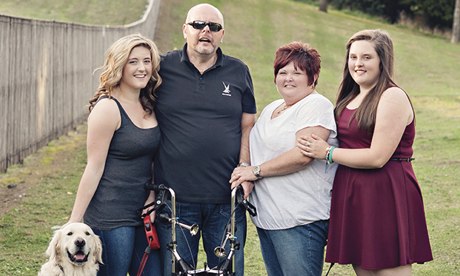
It was his eyes clamping shut that first prompted Keith Swankie to talk to his doctor. The supermarket manager was 38 years old and never imagined that the bouts of blindness were the first symptoms of a rare condition that will eventually kill him.
Swankie has a disease that hardly anyone has heard of: progressive supranuclear palsy (PSP). Often confused with other neuro-degenerative conditions such as Parkinson's disease, PSP is more commonly found in postmortems than during life. It is the disease that actor Dudley Moore had, and is caused by the progressive death of nerve cells in the brain, causing difficulty with balance, movement, vision, speech and swallowing.
Diagnosing PSP before death involves piecing together a jigsaw of clues, ruling out other conditions and, in Swankie's case, a perceptive GP. His initial referral to a specialist brought no answers. "The neurologist said: 'I can't do anything for you'," recalls the father of two.
Then came new symptoms: falls, tremors, difficulty speaking, troubled sleep, irritability. It was only when Swankie's GP was at a conference where a geriatrician was talking about PSP that the pieces started to fall into place. Tests followed and, in April 2012, more than two years after those initial eye problems, Swankie was finally diagnosed. At last he had a name to put to his list of increasingly distressing symptoms – but the diagnosis meant having to accept that he was dying.
Now 42, Swankie recalls the day of his test results. He had gone to the hospital without his wife Sheelagh and remembers returning to the family home in Arbroath, near Dundee, and waiting for her to come in from work. "I had to explain to her what had happened and what the diagnosis was, and it obviously came as a huge blow. When I was discussing it with her, the impact hit me that this isn't going to get better."
The hardest part was telling their daughters, Nikki, 19, and Jordan, 15. "We held off for a while to try and get our own heads round it," he says.
As with anyone with PSP, Swankie cannot say for sure how long he has left. The life expectancy from onset is thought to be around seven years, but pinpointing that onset feels impossible. I have my own experience of the condition. My mother has PSP and every so often my brother and I reluctantly have the conversation about whether the first signs were when she was unsteady on a summer holiday to France. Or was it even earlier, when we thought an unrelated operation had upset her balance?
Swankie says he is trying to be realistic about his own prognosis. "We reckon we are probably midway through it. They usually say seven to 10 years but my consultant was very honest and said five to eight years. It's difficult knowing you probably won't walk your daughter down the aisle or be a grandad. That's the thing that's the biggest cheat, the thing I feel cheated out of in my life."
The family try to go for meals and have friends over, but PSP puts frustrating limits on his life. "On a very bad day, you could struggle to get out of bed. You can struggle to eat a meal because the muscles go into spasm and won't allow you to swallow, which can lead to a choking attack. There's urinary incontinence and bowel incontinence," says Swankie.
It was debilitating symptoms such as those that led Dr Anne Turner, who had the condition, to end her own life in Switzerland in 2006 – a story later dramatised for TV with Julie Walters.Swankie says that on dark days he does discuss with Sheelagh at what point they choose to opt for a "do not resuscitate" (DNR) order. For now, though, he wants to use his time to speak up about PSP.
After attending an event by the PSP Association he was asked if he would feature in a video. "Absolutely. Bring it on," was his reaction. The online short film, Keith's Story, features frank interviews with the family. Swankie hopes it will help raise the profile of a disease that most GPs will probably come across once in their careers at most. Better recognition could secure more funding for research into cures and treatment but would also mean the condition does not get missed so often, say experts.
"I can say with confidence that a lot of people with PSP in their brains are not being recognised," says Dr Ian Coyle-Gilchrist, part of a team of neurologists at Cambridge University researching PSP and related conditions. "A lot of the time it's being missed, or people call it Parkinson's disease or depression or getting old, and some people are just residing in care homes with the wrong label of dementia."
Previous estimates are that around five in 100,000 people have PSP, but Coyle-Gilchrist wants to put a figure on a person's lifetime risk of getting it. Research has much wider potential as well, he says, because it could unlock other neurological conditions. Unlike most forms of dementia: "When we see someone with typical PSP, we can be very confident of what is happening in their brains; the buildup of an abnormal protein called tau. That same protein plays a role in Parkinson's and Alzheimer's. So we have a unique opportunity to study how tau affects our brain and how we can try to stop it."
The neurologist is optimistic that researchers will produce new ways of slowing PSP's progression. Some ways to manage symptoms are already out there, such as drugs for anxiety and Botox for clamping eyelids, he says. The problem is that, much like PSP itself, they are not widely known.
"There is a lot to do to change things now, to slow things down and improve quality of life, while researchers work towards a cure," he says.

